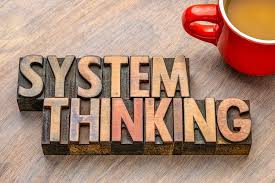Nigeria faces many serious and connected problems- corruption, insecurity, poor governance, and inequality. These challenges don’t exist separately; they affect each other and make one another worse. Education, which is meant to help solve these problems, also suffers from similar deep-rooted issues. To fix these problems, we need a new way of thinking- one that looks at the big picture. This is where systems thinking becomes very important.
What is Systems Thinking?
Systems thinking is a way of understanding how different parts of a system work together and affect each other over time. Instead of focusing on single causes or simple fixes, it looks at patterns, relationships, and the bigger picture. Peter Senge, a leading voice in this field, describes it as learning to see “interrelationships rather than things.”
In education, this means helping students go beyond memorizing facts. It means teaching them to see how systems- like the environment, government, or even schoolsare connected. For example, instead of seeing corruption as just someone doing something wrong, students can learn to see how weak institutions, social habits, and poor leadership all contribute to the problem. This helps them understand not just what is wrong, but why it happens.
Nigeria’s policies and curriculum
Nigeria already has education policies that talk about the need for holistic development and critical thinking. The National Policy on Education and the Nigerian Educational Research and Development Council (NERDC) aim to promote problem-solving and digital literacy. However, in many schools, teaching is still based on memorization, and students rarely learn how to think critically or connect ideas.
Curriculum reforms like Universal Basic Education have tried to improve things, but these efforts often fail to look at the whole system. For example, changes in school content are not matched with changes in teacher training or community involvement. Many reforms are done in isolation and don’t work together.
Research shows that Nigeria’s education system needs a more joined-up approach. Systems thinking helps by showing how all parts of the system- schools, teachers, communities, policies are connected. This allows for long-term, meaningful changes, not just quick fixes. The problem is not the policies themselves, but the lack of follow-through in making them work together.
Learning from other countries
Nigeria can learn from global examples. UNESCO, the United Nations education body, says systems thinking is a key skill for students today. It helps them understand big, complicated challenges- like poverty, climate change, and inequality and how to respond to them.
In the United States, the Next Generation Science Standards include systems thinking to help students understand science in real-world ways. In Finland, students use “phenomenon-based learning” to study real-life issues across different subjects. International schools and the International Baccalaureate (IB) also promote global citizenship and sustainability values that depend on seeing how systems work.
These models show that systems thinking improves how students solve problems, stay engaged, and connect different ideas. Nigeria can use these lessons to create projects that ask students to map out systems, explore causes and effects, and think through real-world problems in their communities.
Why Systems Thinking is also a moral and civic need
Teaching systems thinking is not just about better learning,it’s also about building better citizens. It helps students understand that they are part of a larger society, and that solving problems takes teamwork and responsibility. It also teaches students how government systems work, so they can be more involved and make informed decisions.
From an ethical point of view, systems thinking helps students consider the impact of their actions,not just on themselves, but on others and the environment. It encourages them to think about the long-term effects of choices they make today. For example, when designing a program to create jobs, a systems thinker will also ask: How will this affect inequality, or local businesses, or education?
Building skills for a changing world
Nigeria with its burgeoning youth population faces a fast-changing world ofclimate change, economic shocks, and new technologies. Systems thinking helps people deal with uncertainty. It trains students to be flexible and learn from feedback, instead of looking for easy answers. This kind of thinking is important for future leaders, businesspeople, and policymakers who will need to adapt quickly and work across different sectors.
A systems-thinking mindset also helps prevent repeated mistakes. It teaches people how to reflect, learn, and improve over time. Instead of launching new reforms that fail, leaders trained in systems thinking can design solutions that are realistic, inclusive, and long-lasting.
Nigeria’s education system needs to change to meet today’s complex challenges. Systems thinking is a powerful way to do that. It helps students understand connections, take responsibility, and work toward meaningful change. The country already has policies that aim for holistic learning and systems thinking is how we make those policies real.
By including systems thinking in teacher training, classroom lessons, and school leadership, Nigeria can raise a new generation of citizens who are thoughtful, ethical, and ready to lead. This is more than just an idea for educators- it is a crucial strategy for Nigeria’s future.
In a time of deep and growing challenges, the ability to think in systems is not just useful- it is essential.
Kenneth Uchenna Obiakor is a Social Impact Practitioner and the Founder of Leadership Development Foundation for Civic Literacy. He sits on the board of Victor Nwankwo Leadership Academy as a Non-Executive Director. Email: [email protected]
Research sources for this article:
Nigerian Federal Ministry of Education policy documents; NERDC curriculum framework; UNESCO (2017) Education for SDGs: Learning Objectives; Peter Senge (2006) The Fifth Discipline; Brookings Institution (Fuller & Kim, 2022) policy brief on systems thinking in schools; Hays & Reinders (2020) on Sustainable Learning Education; Oxfam (2017) inequality report; Tribune Online (2023) on Nigerian curriculum; Alberta Education Research Archive.

